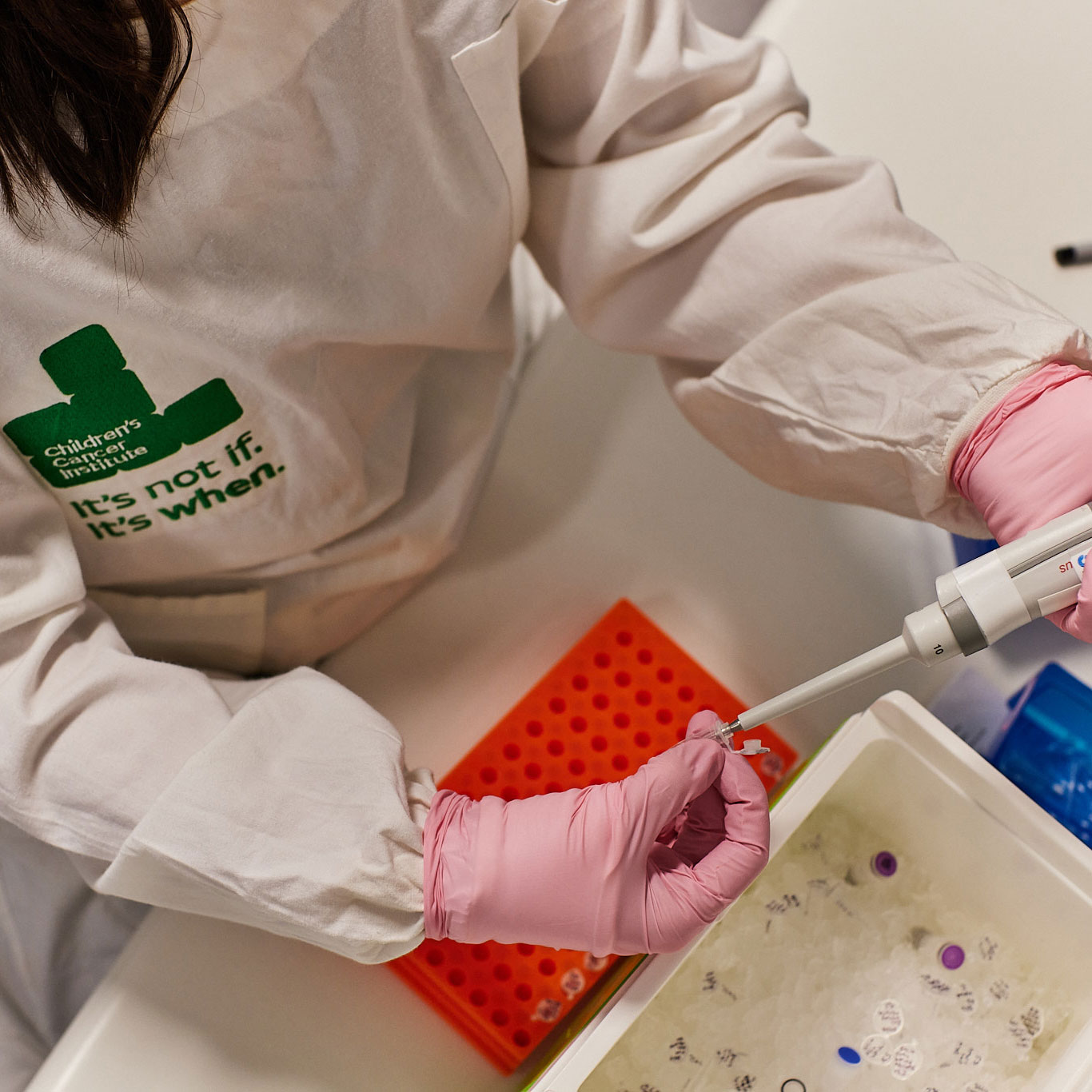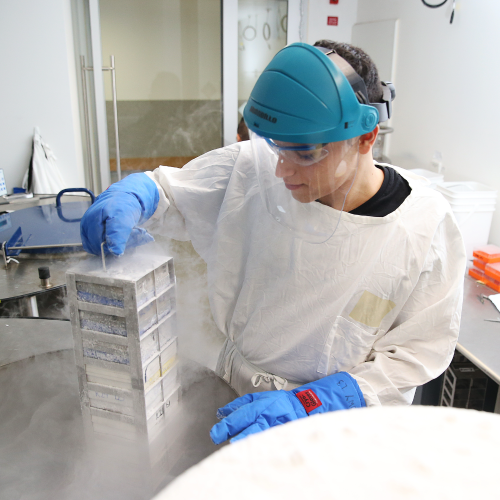Team Leader
What we do
Some people are born with a high risk of cancer. This risk is encoded in their genes, and this risk can be so high that it almost guarantees a person will develop cancer, even at a young age. We now know that at least 15% of children who develop aggressive cancer were born with gene variants that put them at risk of malignancy. For these children, finding out that their cancer is linked to their genes is very significant: it helps explain their cancer, guides treatment, and can identify potential cancer risk in their family.
In the Genomic Childhood Cancer Risk Group, we research how a child’s genes affect their risk of cancer, and explore how understanding cancer risk can help in the management, and eventually elimination, of childhood cancer. We combine genomics, big data analytics and wet lab research to identify new genes and markers of childhood cancer risk, and we leverage our close connections with treating teams and psychosocial researchers to ensure that our findings are translated to the clinic to make a real difference.
We are working towards a future where cancer risk is well-understood and treatable — where children born with high cancer risk are identified before they get sick, and can be given simple and safe treatments to stop any cancer before it ever develops.
Research projects
Genomic biomarkers of cancer biology and risk
Contact: Dr Mark Pinese, MPinese@ccia.org.au; Sheena Nunag, SNunag@ccia.org.au
Precision cancer medicine aims to improve patient outcomes through matching each patient to their optimal treatment. To date, this matching has been primarily based on DNA mutations: a specific mutation in a patient’s cancer might suggest a matching treatment that is tailored to attack cancers with that mutation. However, this approach has its drawbacks, the most serious being that for most mutations we do not have a matching treatment. The result is that some patients may be missing out on optimal treatment.
In this project, we aim to address this drawback by investigating whether a biomarker approach can match treatments to more patients. Our biomarker approach examines the patterns of mutations in a patient's cancer, rather than specific mutations, and uses these patterns to identify suitable drugs for that patient. This approach has shown promise in adult breast cancer, but has not yet been established in childhood cancer. By applying the techniques developed in this project to children enrolled in the Zero Childhood Cancer Program (ZERO), we hope to improve our ability to match patients to the treatments that will work best for them, thereby improving both survival and survivorship of children with cancer.
Utility of whole genome sequencing to diagnose paediatric cancer predisposition syndromes
Contact: Dr Mark Pinese, MPinese@ccia.org.au; Eliza Courtney, ECourtney@ccia.org.au
Evidence of clinical utility is required before new genomic tests are introduced into standard care. Currently, there is very little evidence supporting the use of whole-genome sequencing (WGS) approaches for the purpose of diagnosing cancer predisposition syndromes (CPS) in children with cancer. Identifying CPS is important, since it provides information about significant cancer risks that can guide the implementation of early detection and/or risk-reducing strategies for patients and their at-risk family members. While WGS can detect clinically actionable germline variants associated with CPS in children, it remains unclear whether there is sufficient evidence of clinical utility to implement it as part of routine care.
This research aims to evaluate the clinical utility of using WGS for the diagnosis of CPS in children with cancer. The project will assess multiple aspects of clinical utility and is essential for informing if and how germline WGS should be implemented into routine care for children with cancer in the Australian context.
Data-driven identification of paediatric cancer risk genes
Contact: Dr Mark Pinese, MPinese@ccia.org.au
How do we know for certain which genes can impact cancer risk? Unfortunately, for most genes there is simply no clear consensus as to whether their variants predispose to cancer. Part of the difficulty in achieving this consensus is that the risk varies according to context such as tumour type, or ethnic and environmental factors. Additionally, risk changes over time, making gene lists that have been created for cancer predisposition in adults unlikely to be entirely applicable to paediatric cancer risk genes.
Many groups have therefore drawn upon scientific literature to manually curate their own lists of cancer risk genes. While this may serve individual groups, it contributes to the lack of consensus and does little to identify new paediatric cancer risk genes that have not already been extensively covered by prior studies.
This project aims to take a different approach using a data-driven methodology. By identifying the underlying characteristics that contribute to cancer predisposition genes, we hope to integrate this information to isolate other genes or modules that may also contribute. An important part of this project extends to quantifying these risks over time, providing a framework from which the effectiveness of future interventions could be assessed.
Cancer risk biomarkers in non-malignant tissue
Contact: Dr Mark Pinese, MPinese@ccia.org.au; Sheena Nunag, SNunag@ccia.org.au
How do we identify cancer risk before a person develops cancer? The conventional approach is to look for risk-associated genetic variants. However, this doesn’t work well in practice because for most genetic variants, it is not known whether they are associated with cancer risk or not. What if, instead of looking for risk-associated genetic variants, we could measure a person’s cancer risk directly?
Preliminary work suggests this is possible. In healthy adults, we know that specific measurable blood markers predict whether that adult will go on to develop cancer. This forms a blood test for cancer risk in adults. What remains unanswered is whether a similar approach would work in children. This project aims to apply methods established in adult samples to genomic data from ZERO and PREDICT, to identify blood biomarkers of cancer risk in children. The eventual outcome could be the first biomarker-driven blood test for children’s cancer risk, which has the potential to expand the number of children in which we can identify cancer risk.
Leveraging pleiotropy to identify polygenic determinants of paediatric cancer risk
Contact: Dr Mark Pinese, MPinese@ccia.org.au
Our knowledge of the genetic drivers of childhood cancer risk is currently dominated by monogenic conditions: high-effect variants in key cancer risk genes that alone are enough to cause significant cancer risk in a child. But is there an alternative mode of cancer risk − one that is mediated by hundreds or thousands of genetic variants, each of small effect, that together put a child at significant risk of cancer? This polygenic model of cancer risk is well-established in common adult cancers such as breast and prostate cancer, but has been difficult to test in comparatively rare children’s cancers.
This project aims to address this knowledge gap by applying a novel technique to test for the significance of cancer risk scores in children’s cancer. Our approach leverages pleiotropy – the concept that a genetic influence can have multiple effects – to test whether polygenic predictors of adult cancer risk also have some ability to predict children’s cancer risk. The outcome of this work could be polygenic determinants of childhood cancer risk, with the potential to massively expand the number of children in whom we can identify cancer risk.
Complex and neglected variation as a mediator of childhood cancer risk
Contact: Dr Mark Pinese, MPinese@ccia.org.au; Naomi Warren, nwarren@ccia.org.au
Research and clinical practice in the genomic determinants of disease have focussed on genetic variation that is simple to detect and understand, being molecular variants and large copy number changes. However, there are numerous isolated examples of more complex variation being important in human health and disease. This complex variation is likely to also play a role in childhood cancer risk. However, no systematic survey of the link between complex variation and childhood cancer has been performed.
Using data from ZERO and collaborators, and leveraging our expertise in genomics, we can address this knowledge gap. This project will assess the prevalence and significance of multiple classes of complex and neglected variation in childhood cancer. Key classes of variation will be small CNV, structural variants, TREs, MEIs, and regulatory variation. The outcome will be the first survey of complex germline variation as a potential mediator of paediatric cancer risk, with the potential to expand the scope and increase the diagnosis rate of genetic testing for childhood cancer.
Team
Group Leader
Research Genetic Counsellor
Eliza Courtney
PhD Students
Eliza Courtney
Shuxiang Goh
Postdoctoral Scientist
Dr Sheena Nunag
Research Assistants
Gabi Ryan
News & blogs

Zebrafish models offer fast and effective guidance for perso...

It's not just about the 'type' of cancer anymore

Michelle Haber discusses the 42 years she has dedicated to c...

Children's Cancer Institute Extends Congratulations to Austr...
Get in touch
Do you have a question about our work? For any enquiries please don’t hesitate to contact us.









